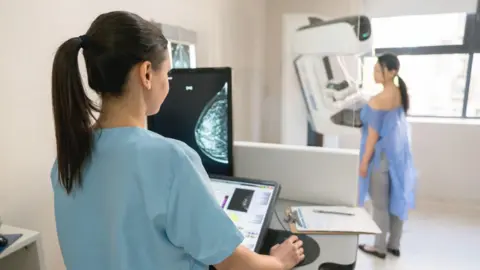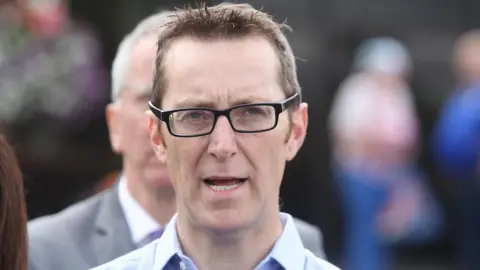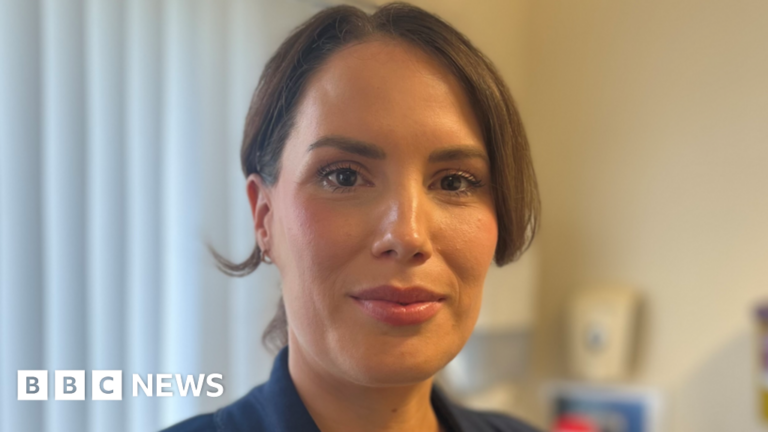Marie-Louise ConnollyHealth correspondent, BBC News NI
A County Antrim GP has said she is “hugely concerned” for women who need breast cancer treatment in Northern Ireland after three patients in her surgery received late cancer diagnoses.
The patients are among 32 women in the Notting Hill Medical Practice, based in the Northern Trust, who were red-flagged within a five-month period this year.
The three women, who have asked for their identities to be protected, had to wait more than eight weeks to be seen by a consultant, while nine others are still waiting, one for more than 10 weeks.
Dr Jilly O’Hagan told BBC News NI the wait is “traumatic”.
One of the women said she has been in limbo for months and “just wants the cancer out”.
She said that after being told there were more than 80,000 women in front of her on the waiting list, she paid for a private diagnosis which confirmed she had stage two breast cancer.
The woman said she is “furious” about the delay and is feeling the strain mentally and physically.
Dr O’Hagan said such failings are not happening in England, Scotland and Wales and asked why women in Northern Ireland should be getting a “substandard service”.
“The new regional breast cancer service is not functioning – there is a bottleneck, they are not meeting the targets for women who are red-flagged,” Dr O’Hagan said.
“It never used to be like this, it’s not working.”
Red-flag referral
A red-flag referral means a GP believes the patient should be treated as a high priority for suspected cancer based on specific clinical symptoms outlined in the Northern Ireland Cancer Network (NICaN).
These referrals are the highest priority for waiting lists, and patients should ideally be seen by a specialist within two weeks.
After a diagnosis, there is a 62-day target for treatment to start.
Between April to June 2025, about 840 patients (67%) waited longer than 62 days to start treatment for cancer following an urgent GP referral for suspected cancer.
 Getty Images
Getty ImagesA woman in the Southern Trust area who has stage four breast cancer said all the “faffing around between various health trusts and hospitals” delayed her diagnosis.
In her early 40s, she said she is an “emotional wreck” after being told different outcomes between different health trusts.
“My care has been inadequate, not joined up and impersonal,” she said.
In June, the woman first felt what she described as like a “pull” under her armpit.
It was two weeks before she could get an appointment with her GP who on examination felt a “pea-sized” lump and red-flagged her in early July.
With a history of breast cancer in the family, the woman had received two previous annual mammograms both of which had been clear.
After she was red-flagged, there was confusion as she received communication between Craigavon Area Hospital and then was referred to the Ulster Hospital, in a different health trust.
The mother of three considered seeking private treatment in Northern Ireland or the Republic of Ireland.
The pea-sized lump had got larger, and her breast was red and swollen.
Almost 10 weeks after that initial GP appointment, she was diagnosed with stage four cancer in August and began chemotherapy at the end of October.
“It’s been horrific and my family and I are emotional wrecks,” she said.
Her experience prompted her to write to the health minister.
‘UK’s worst cancer waiting times’
Naser Turabi, from Cancer Research UK, said Northern Ireland’s cancer waiting times are the worst in the UK.
Too many patients are waiting too long for treatment, particularly for cancers like lung, gynaecological and blood that can often be quite aggressive, Mr Turabi told BBC News NI.
“It’s a matter of patient safety and survival with around 70% of patients missing the target every month, that represents thousands of people whose treatment is being delayed and they are potentially coming to harm.”
Research shows that getting treatment quickly is crucial with every four-week delay reducing patient survival by an average of 10%.
In August, BBC News NI reported that some patients who have been red-flagged for breast cancer assessments are waiting up to 10 weeks to be seen.
The target set by Northern Ireland’s devolved Department of Health, which oversees five health and social care trusts, is 14 days.
‘Appalling statistic’
 Pacemaker
PacemakerThe chair of Stormont’s health committee, Sinn Féin’s Philip McGuigan, said women were being let down.
“In the three months prior to June of this year almost 2,000 patients were seen by breast cancer specialists following urgent referral for breast cancer,” he said.
“Only 129 of those patients were seen within 14 days of their urgent referrals
“So the examples of Dr O’Hagan’s practice are unfortunately far too common across the north and it is totally unacceptable.”
Another member of the committee, the DUP’s Diane Dodds said that the new regional cancer service “does not seem to be actually set up in a way that makes it efficient and makes women be seen much, much earlier”.
She said it was not just patients with breast cancer who were being failed: “In the quarter up to June 2025, 840 patients – two third of all patients diagnosed with cancer – waited longer that 62 days to start treatment.
“That, across all the tumour sites, all of the cancer issues, is an appalling statistic.”
‘Heightened patient anxiety’
In a statement the Department of Health said: “The implementation of the single regional waiting list for breast assessment was introduced in May to address regional inequity for people accessing breast assessment.
“However current core capacity of the breast assessment service is insufficient to meet ongoing demand.
“For this reason, £5m has been allocated through the Elective Care Framework to address this capacity shortfall.”
Health Minister Mike Nesbitt said he recognised that “delays in access to breast assessment will heighten patient anxiety” and welcomed that, in recent weeks, women have waited about seven weeks to be seen.
“While this is still too long, I anticipate that this will continue to reduce,” he added.
Waiting list money ‘diverted’
According to the Department of Health, since April 2025, more than 122,600 red-flag or time-critical patients have been seen or treated, with plans to reach about 226,700 by the end of the year.
“Outpatient waits over four years are down 29% – that’s 29,500 patients – and treatment waits down 41% – that’s 8,300 patients,” a spokesperson said.
Earlier this year, £215m was set aside to tackle hospital waiting lists.
But on Tuesday the Health Minister, Mike Nesbitt, confirmed that a third of that money has since been diverted to deal with the Department of Health’s (DoH) massive deficit.
During a debate on cancer waiting times in the assembly, the minister said more than £70m had been used to help tackle budget difficulties.
The DoH had faced a deficit of £600m and has been reducing that figure through efficiencies.
Nesbitt told assembly members there had been some improvements on hospital waiting lists, but acknowledged there was more still to be done.



